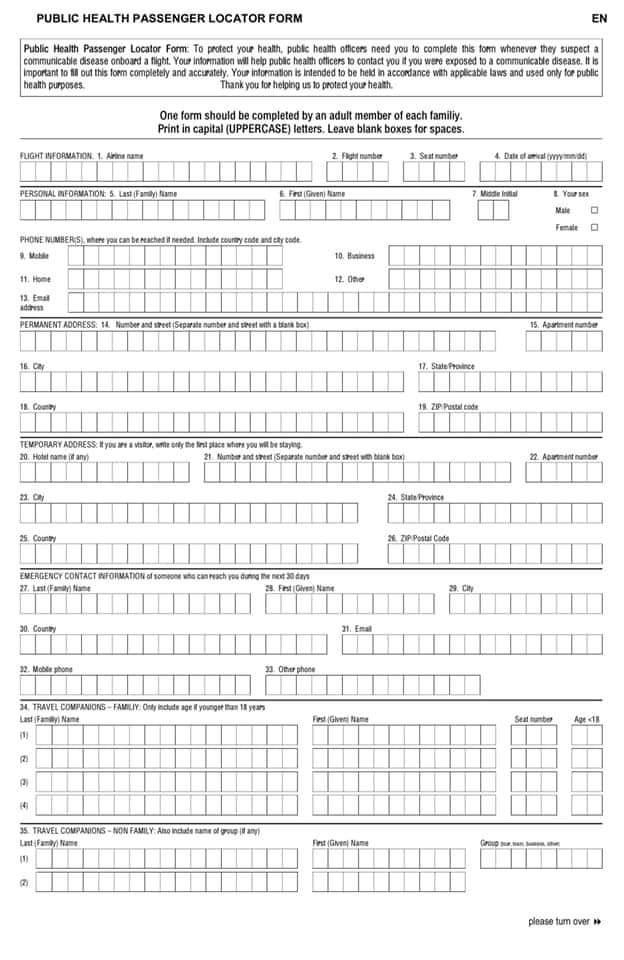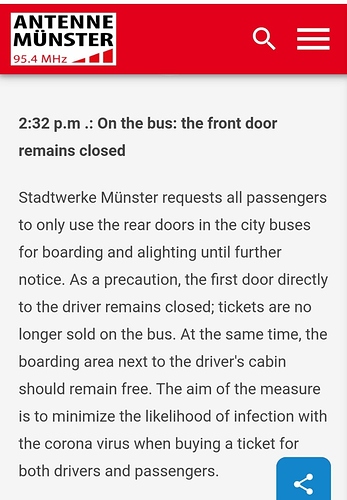Update from the German Federal Foreign Office as on 14th May 2020
Coronavirus and entry restrictions: 6 things travellers to Germany need to know
1. Entry: travel restrictions, border controls and quarantine
Germany introduced travel restrictions for entries from outside the Schengen area on 17 March 2020. They were last prolonged on 14 May 2020, based on an EU recommendation. All corresponding entries from non-EU-citizens and citizens of non-Schengen states by plane or ship will be affected. Entry will be possible for German citizens.
Citizens of EU member states and their families, as well as citizens of the United Kingdom, Iceland, Liechtenstein, Norway and Switzerland and their families are also allowed to travel through Germany to reach their home country if no other travel connection is possible. They will also be allowed to enter if their home or legal residence is in Germany. Other people may be refused entry if they cannot provide proof of urgent reasons for their entry. Please refer to the website of the Federal Ministry of the Interior, Building and Community for details.
In addition, temporary borders controls between Germany and France, Austria and Switzerland have been prolonged. The same applies to air borders with Italy and Spain . Deliveries of goods and commuters are allowed to cross these borders. Travellers on non-essential travels may be refused entry. These border controls were prolonged on 15 April 2020. Checks at the border with Luxembourg will end at midnight on 15 May 2020. Germany is also willing to end checks at the border with Denmark . A date for the end has yet to be agreed upon by both countries. Further Information on border controls The Ministry of the Interior also provides more detailed Information on border controls in an FAQ.
Depending on the local regulations by the Länder, people entering the country from abroad may be required to spend two weeks in mandatory quarantine. The details of the competent public health office (Gesundheitsamt) can be found by entering your postal code into the tool on the RKI Website.
All travellers should take note of the information and instructions outlined in the following leaflet. Leaflets will be handed out by carriers to passengers on trips to Germany:
Handout on coronavirus
Travellers should also expect more scrutiny during checks, as more comprehensive questions may be posed and health checks performed in doubtful cases. Measures may also be adjusted when necessary.
More detailed information on entry requirements and procedures are available here:
Ministry of Transport
Ministry of Health
2. Facilitations for expiring visas and residence permits
To take into account the current difficulties in leaving the country before a visa/residence permit expires, the following facilitations apply:
- Citizens whose national visa (D visa) is about to expire should submit an application for an extension to the relevant immigration office by email before expiry. Until the decision of the immigration office has been made, the residence will remain legal. Personal details (surname, maiden name, first name, spelling of the names, date of birth, place and district of birth, gender, nationality, passport number), type of title and any file number must be specified. It is advisable to carry a printed version of the application in addition to the expired visa and your passport/ID card.
- Citizens who were in Germany on 17 March 2020 with a valid Schengen visa (C visa) or who entered Germany after 17 March 2020 and before 9 April 2020 with a valid Schengen visa are exempted from the requirement of a residence title until 30 June 2020. The other conditions under which the respective Schengen visa was issued remain unaffected until then.
- Citizens who are allowed to enter and stay in the Schengen area for 90 days within a period of 180 days without a visa should contact the relevant immigration office before expiry of that period and provide their personal details (see above) to legalise their stay (if necessary by email). Provided that this application reaches the authority before expiry of the named period, the stay will remain legal until a decision is made by the immigration office. It is advisable to carry a printed version of the application in addition to the expired title and your passport/ID card.
This also applies to third-country nationals of those countries listed in section 41 (1) of the Ordinance Governing Residence who did not require a visa to enter the Federal Republic of Germany. If the individual has approval from the Federal Employment Agency and has applied for a residence title as described above, they may take up the employment stated in the notification approval from the Federal Employment Agency.
The solution above does not apply to third-country nationals of those countries listed in section 41 (1) of the Ordinance Governing Residence who have already entered the Federal Republic of Germany and did not require a visa but who do not yet have approval from the Federal Employment Agency. They are asked to contact the relevant immigration office.
Citizens whose residence permit expires during their stay abroad and who were unable to travel to Germany in time due to existing travel restrictions may submit an application for renewal of their residence permit informally (i.e. by email) to the relevant immigration office. If the application is submitted before the expiry of the residence permit, the residence Permit will remain valid from the time of its expiry until a decision is made by the immigration office. For subsequent re-entry, however, a Fiktionsbescheinigung (fictional certificate) is required, which will normally be sent to the diplomatic mission nearest to the person’s place of residence. The procedure described above also applies if the residence permit has already expired at the time of the application and the immigration office has approved its continued validity.
Further details are available here.
3. How to conduct yourself when in Germany?
Some establishments such as bars, clubs, theatres and cinemas are required to remain closed. Most stores are allowed to open, but access may be restricted. Also, customers are required to cover their mouth and nose i.e. by wearing a mask or using a scarf.
Mouth and nose must also be covered aboard any public Transport.
If travellers develop symptoms associated with COVID-19 (coughing, a runny nose, sore throat or fever) they should get in touch by phone with a doctor or contact the hotline 116 117. Often travel guides or hotels can also help in such cases. Travellers should keep the contact details of their home country’s embassy or consulate in Germany in case they need to contact them.
Extensive information in English and other languages on current regulations is available here.
4. Transits through other countries and returning home
Due to many recent travel restrictions, Germany has warned its citizens against non-essential travels for tourism purposes to other countries.
A number of countries have imposed travel restrictions in connection with the coronavirus outbreak. Some of them may also ban entry or impose quarantine measures on travellers coming from Germany. These may change very quickly.
Travelers are therefore advised to contact the embassy or consulate of their country of transit or destination to receive information on possible entry restrictions. Travellers should also keep themselves informed about any changes during their stay abroad. In many cases, the health ministry or competent authorities provide information for travellers on their websites.
5. Travel warning of the Federal Foreign Office
At present, people are strongly advised to avoid non-essential travel abroad for tourism purposes, as travellers may encounter strict or drastic restrictions on international air travel or tourism, worldwide entry restrictions, quarantine measures or restrictions to public life in many countries. This warning will be in place for the foreseeable future, initially until 14 June 2020.
Any tourists still abroad should return home so long as it is still possible to travel.
6. Where to find more information
More information is available from the following institutions:
Information on coronavirus and regulations in English and other languages
Ministry of the Interior
Ministry of Health
Ministry of Transport
The World Health Organization
Robert Koch Institute
Risk areas by Robert Koch Institute (German only)
Read complete details at the below link:
Source: Federal Foreign Office
Disclaimer: Information in this post is reproduced “as is” without warranty of any kind.







